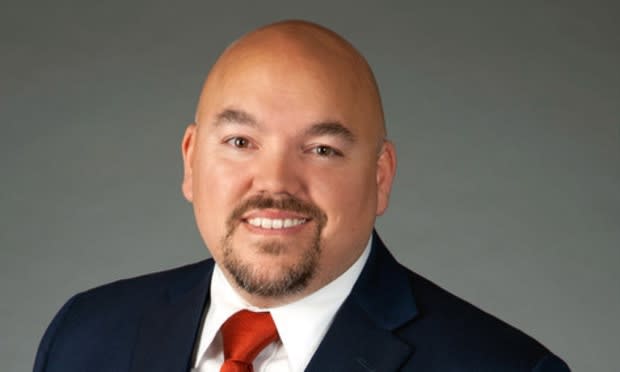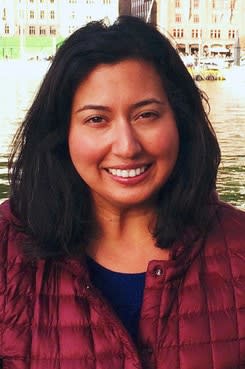Smith Gambrell Launches AI Lab to Advance IP Legal Operations

Michael Riesen, Smith Gambrell & Russell, Atlanta. (Courtesy photo)
Smith Gambrell & Russell has recruited patent lawyers Mike Riesen and Indhira LaPuma to start an artificial intelligence lab for the firm, with the initial aim of making patent prosecution and IP portfolio management more cost-effective and efficient.

Indhira A. LaPuma, Smith, Gambrell & Russell. (Courtesy photo)
Riesen, who joined as a partner from BakerHostetler, is the executive director of SGR Labs, which launched this month. LaPuma, who joined Smith Gambrell this week as counsel, was innovation counsel for one of Riesen’s clients, VF Corp., the holding company for retail brands such as North Face, Timberland, Wrangler and Vans.
The two Atlanta-based lawyers were planning to start their own company, Riesen said, providing both legal services and counsel on updating legal operations to help in-house law departments better interface with the business side. Both have backgrounds in computer engineering.
He told Greg Kirsch, who heads Smith Gambrell’s IP department, about their plan over coffee—then pitched it to the firm’s executive committee.
“They were willing to take on our unconventional scenario,” said Riesen, who’d worked as Kirsch’s associate almost a decade ago at Ballard Spahr. “We will take on things that don’t look like the billable hour while still continuing to practice law with our clients.”
Kirsch said Smith Gambrell has a full-service IP practice with about 30 lawyers, of whom half are IP litigators and half are patent lawyers. “I think Mike and Indhira are going to be a critical part of our further expansion,” he said.
“We’ve got the full breadth of engineering, electrical, mechanical, biotech and medical devices,” Kirsch said, as far as patent prosecution expertise. “They really add to that.”
What It Does
There are three areas where the new SGR Labs can help both the firm and clients, said Riesen: data analytics, software implementation and automation.
Data analytics is a way to “help the communication between the legal department and the business units for a client,” Riesen said, by allowing nonlawyers to quickly visualize the data that’s already there, such as a company’s patent holdings.
“We want to make sure the GCs of the world have the information at their fingertips. They are constantly bombarded with questions from the business unit,” he said. “For example, a GC calls me up and says, ‘Mike I’m going into a meeting with the business side. What patents do we have that cover this product?”
With proper legal operations, Riesen said, a company's legal team already has that understanding and can customize the data visualization for lawyers or non-lawyers. “The GC can give nonlawyers a version they can work with and make decisions on.”
“Delivering legal services has to be practical,” he said. “The business people want to make a decision in 15 minutes.”
A business unit could be looking at a new product that it wants to rush to market, Riesen said, but its legal department may say it needs a patent, which could take two years to procure. “The business people want to know why they need a patent. They want to move fast."
“The legal department needs to demonstrate the connection between the IP portfolio and the bottom line,” he said. “They have the data—the company's investment in patents versus the cost of IP litigation, settlement or licensing. It’s there, but they need to extract it in a way that’s useful for the business side.”
The longer-term goal for the lab, Riesen said, is to be able to measure the time and cost of procuring a patent versus the risks and costs of infringement.
“Indhira is very helpful in keeping me grounded,” Riesen said, noting LaPuma's experience in-house at VF Corp. and Caterpillar. “She has navigated the questions between in-house lawyers, the business guys and inventors.”
Software implementation, one of the lab's other priorities, means making sure a legal team has the right tool for the right job. “We’ve audited a lot of softwares,” Riesen said, adding that, if the right contract management solution, for instance, isn’t available, then they can build it. He and LaPuma are working with a pool of contract software developers, who are also patent attorneys.
Robot Lawyers?
Using automation to reduce expensive lawyer time spent on legal work is the third area Riesen and LaPuma are focused on.
“People like to throw around the term ‘bill smarter time.’ We’re here to help that,” said Riesen, who has a master's degree in AI and machine learning.
For a patent application, a subject-matter expert must first work with an inventor and write up the patent claims, Riesen said, which can’t be outsourced to a computer. But once that is done, it can take another 20 to 30 hours to write the full patent application. He said AI software with machine learning capabilities can assist in drafting portions of it.
There is a lot of hype in this area, he cautioned. “Right now, there are a lot of people out there pitching software that they say can give you the final product and you can go file it. I’ve never seen a single product out there that meets my or my clients’ expectations for something ready to be filed with the government,” he said. “You need quality control.”
SGR Labs is working with both Smith Gambrell lawyers and client legal departments. Services can be billed either hourly or on a flat fee, Riesen said, adding that flat fee services include patent portfolio assessment and management (which could be a monthly fee).



